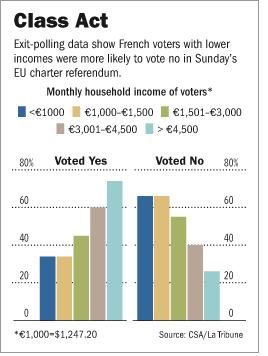
Dynamics

|
Generational Dynamics |
| Forecasting America's Destiny ... and the World's | |
| HOME WEB LOG COUNTRY WIKI COMMENT FORUM DOWNLOADS ABOUT | |
The European Union crisis appears to be substantially worse than analysts are saying, because the generational implications are quite clear that opposition to a closer Union is only going to grow.
 |
Most journalists are focusing their coverage of the referendum result on the only things they understand: purely 1990s issues, such as breakdowns by social class and income. The adjoining graph, which appears on page 1 of Tuesday's Wall Street Journal is typical.
Many analysts have been comparing Sunday's results with France's 1992 referendum on the Maastricht treaty -- the last time that the French voted for or against a more unified Europe. The French voted narrowly in favor of the treaty then, and recently one analyst, Philippe Hubert, explained it this way: The vote on the Maastricht treaty "revealed a fracture between two Frances: one working class, less educated, with low incomes, strongly opposed to the treaty; and the other, well-to-do, well educated, more "integrated," massively mobilized to say 'yes'."
However, Hubert is puzzled why this same breakdown doesn't apply today. Today, the split is measured in different ways, according to exit polls from Sunday's referendum.
Differences are measured by the profession of the voter:
Profession of the voter Yes No Result
----------------------------------------- --- --- ------
Farmers 30% 70% NO
Craftsmen, tradesmen, heads of company 49% 51% NO
Well-paid professionals, senior executive 65% 35% YES
Middle managers 47% 53% NO
Employees 33% 67% NO
Workmen 21% 79% NO
and also by income of the voter:
Monthly income (euros) Yes No Result
---------------------- --- --- ------
< 1000 40% 60% NO
1000-2000 35% 65% NO
2000-3000 42% 58% NO
>3000 63% 37% YES
Looking at these tables, you can see why the analysts are expressing concern. Among these demographic groups, the only ones that favored the Constitution were the top tier -- the highest paid professionals with the highest incomes. Hubert and the other analysts wonder: why did we lose the second tier, the middle managers and the moderately highly paid?
The problem is that Sunday's results are not directly comparable to the 1992 results. Today's senior executives were middle managers in 1992; today's highly paid were moderately highly paid in 1992; and so, the pro-Europeans didn't lose these people. You just have to remember that the people who voted in 1992 are all 13 years older today.
Unfortunately, none of these analysts are doing a generational analysis, and so they're missing the most important point.
Here's the result of the 1992 vote on the Maastricht treaty:
1992 vote
Age Yes No Result
----- ----- ----- ------
18-24 50.7% 49.3% YES
25-34 47.8% 52.2% NO
35-49 50.8% 49.2% YES
50-64 52.6% 47.4% YES
65+ 54.6% 45.4% YES
And here are the results of Sunday's referendum, based on exit polls:
2005 vote
Age Yes No Result
----- --- --- ------
18-24 44% 56% NO
25-34 45% 55% NO
35-44 39% 61% NO
45-59 38% 62% NO
60-69 56% 44% YES
70+ 58% 42% YES
Now, remember that the people in the 2005 vote are 13 years older than the same people in the 1992 vote. When you compare these two tables, you see that almost everyone voted exactly the same, the only exception being the 18-24 group in 1992.
And you see the most remarkable thing of all: With the exception of that same group, the YES/NO vote was approximately split between those born before and after the end of WW II, respectively.
You'd think that somebody would have noticed this besides me; it's not exactly rocket science. But that's how blind almost all journalists, pundits, and high-paid analysts are to even the simplest generational concepts. They're so completely bound up in concepts like social class and income, that they miss even the simplest things having to do with generational changes.
If you've read this web site or either of my books, you know that I repeat over and over that the generational cycle is caused by this very phenomenon: That the world view of people who live through a crisis war (like WW II) is completely different from people who are born after the end of the crisis war. It's almost impossible to overestimate the enormity of this difference in world view, and it's the crucial factor in analyzing the French referendum.
Basically what we have is this: The European Union was designed, during the last few decades, by a diminishing group of people with one world view, and is today being rejected by growing group of younger people with a completely different world view. No wonder it's being rejected.
In a previous article, I quoted a voter speaking to a BBC reporter: "My grandfather fought in World War I. My father fought in World Wars I and II. I fought in World War II. And now, for 60 years, my children and grandchildren have lived in peace. That's a good enough reason to me to vote 'yes' on the Constitution."
Not one of the analysis articles I've read has referenced this issue. The narcissistic reporters writing all those articles believe that a view like the one we just quoted is quaint and trivial, not worth commenting on. Instead, they often give reasons that are just plain silly, such as this paragraph from an analysis article: "Indeed, the sense that élite politicians, businessmen, and journalists have built modern Europe without bothering to consult its people fueled much of the resentment against the Constitution, exit polls suggest."
Apparently this writer considered "consultation resentment" to be an important factor in Sunday's vote, but WW II to be unimportant.
Actually, it does make sense if you change "élite" to "those who fought or grew up in WW II," and change "people" to "those born after the war." Modern Europe was built for decades by those with one world view, without bothering to consult with the younger generations with a totally different world view.
Voters over age 60 are genuinely afraid of another war between France and Germany, and they believe that a European Union will make such a war unlikely. That's been the driving force for a European Union for the decades since WW II. But these people are disappearing rapidly.
And that's why the EU is now going to fall apart. The people who were born after WW II have no such fear of war; in fact, they feel no attachment to and see no value in a European Union at all, except insofar as it immediately benefits them personally.
 |
The value of the euro currency has been falling sharply since the referendum, falling on Tuesday to $1.23. This is not particularly alarming, since it was only a few years ago that its value was just 92 cents, and the euro has far to go before it reaches that level.
However, it's worth pointing out at this point that last year, the international investment firm Morgan Stanley warned that it's a real possibility that the euro will collapse entirely in 2005, because some EU countries have a "more virtuous budgetary policy" than others.
We won't repeat all the reasons here, but they can be found in the article that I wrote last year in August. That reasoning is highly relevant to the current problems of the EU.
All 25 EU member states must individually ratify the Constitution - either by national referendum or parliamentary vote - for it to take effect. Nine member states have already ratified the treaty.
The following (Source:AP) table lists the status and dates for scheduled referendum votes:
1. Austria Parliamentary vote
2. Germany Parliamentary vote
3. Greece Parliamentary vote
4. Hungary Parliamentary vote
5. Italy Parliamentary vote
6. Lithuania Parliamentary vote
7. Slovakia Parliamentary vote
8. Slovenia Parliamentary vote
9. Spain Referendum
Partially ratified
1. Belgium Parliamentary vote
Upcoming Votes:
1. Netherlands: June 1 Referendum
2. Luxembourg: July 10 Referendum
3. Malta: mid July Parliamentary vote
4. Denmark: Sept. 1 Referendum
5. Ireland: Late 2005 Referendum
6. Portugal: Late 2005 Referendum
7. UK: Spring 2006 Referendum
8. Czech Republic: Summer 2006 Referendum
Date not yet set: Poland, Latvia, Estonia, Finland,
Sweden, Cyprus
As you can see, most of the ratifications have been done by each country's "élite" in the Parliament; almost all the rest will require a public referendum, the first occurring today in the Netherlands.
With people who lived during WW II rapidly disappearing, it appears very unlikely that many of these public referendums will be successful.
Generational Dynamics predicts that Western Europe is indeed headed for a new major crisis war, just as it's had major crisis wars for two millennia or more. We do not yet know how countries will choose sides in this war, but right now it looks pretty certain that England and France will have yet another war with one another, as part of the general "clash of civilizations" world war. We do not yet know whether Germany will side with France or England, but another war between Germany and France is at least 50% likely.
After the war ends, the survivors will all have lived through a crisis war and will all have the same world view again. Europe will make another attempt at a Union, and will probably succeed at that time.